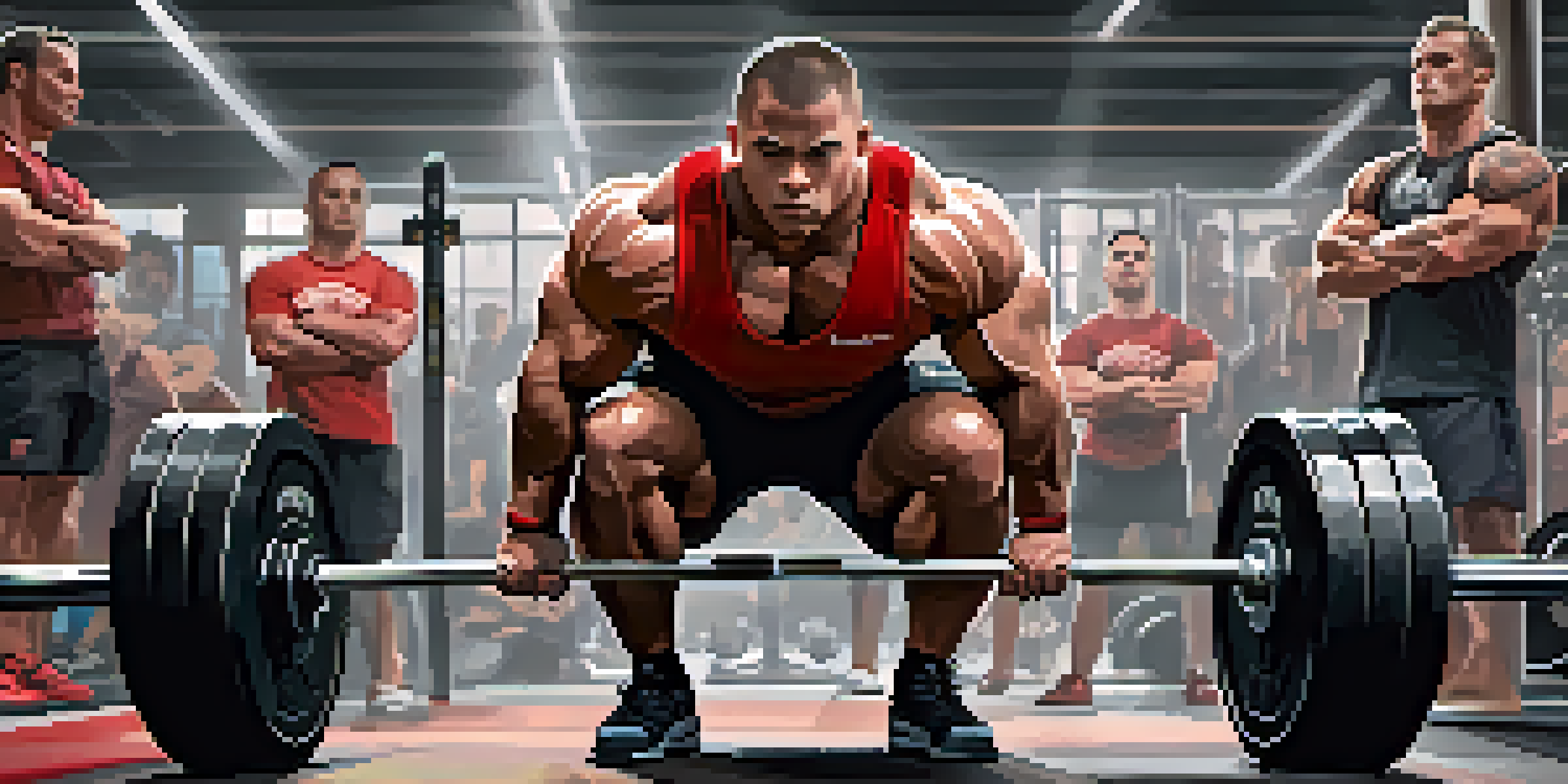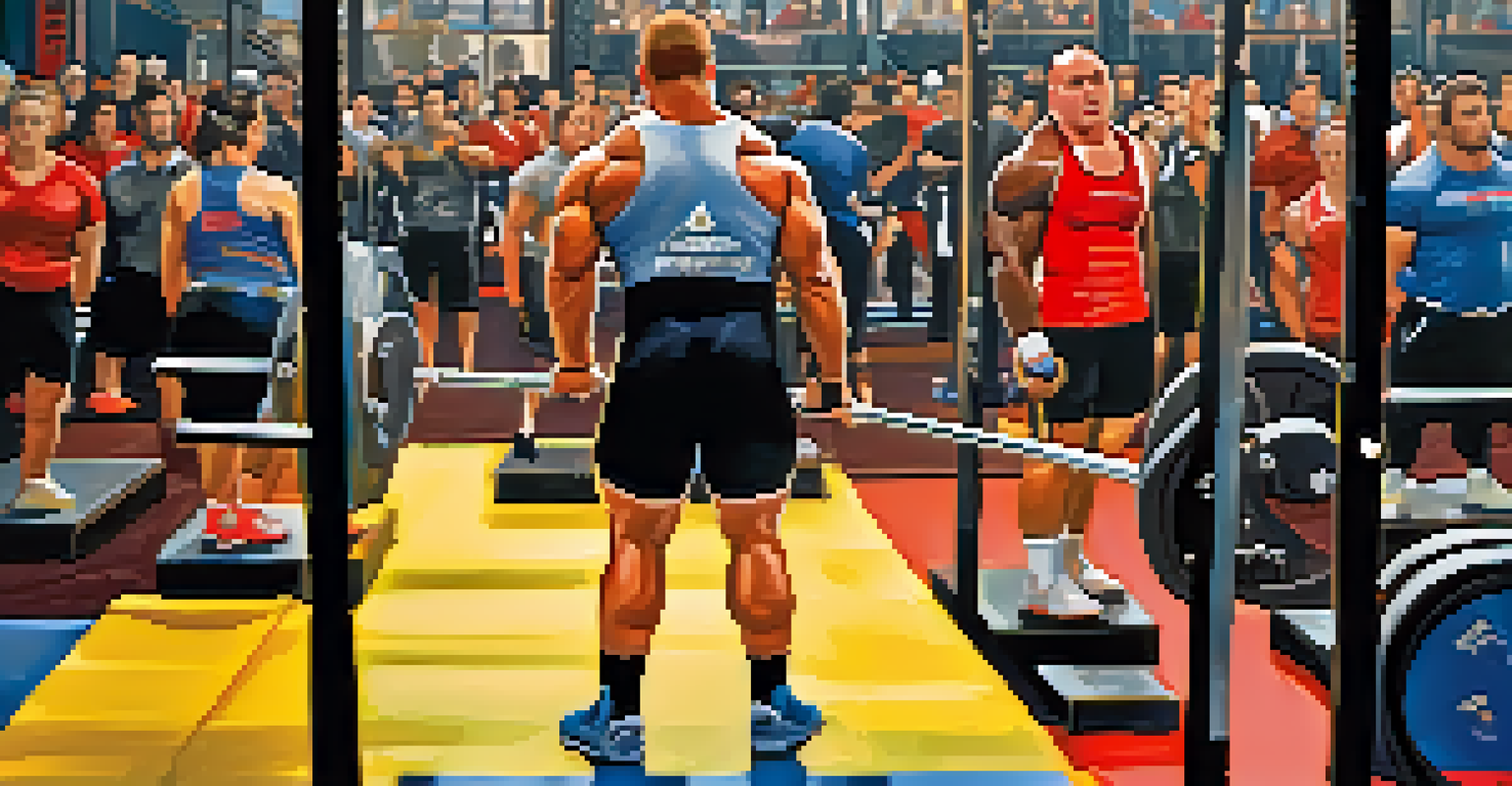Powerlifting and Growth Hormone: A Vital Connection

Understanding Powerlifting: A Strength Sport Overview
Powerlifting is a strength sport focusing on three main lifts: the squat, bench press, and deadlift. Each athlete strives to lift the heaviest weights possible in these categories, showcasing their raw strength. It's not just about muscle; technique and mental fortitude play significant roles in achieving personal bests.
Strength does not come from physical capacity. It comes from an indomitable will.
The sport has gained immense popularity, drawing in participants of all ages and backgrounds. Competitions can be found worldwide, providing a platform for lifters to showcase their skills. For many, powerlifting becomes a lifestyle, driven by the pursuit of strength and improvement.
In this landscape, understanding the physiological factors that contribute to strength gains is crucial. One such factor is growth hormone, which plays a vital role in muscle development and recovery. Let's dive deeper into the connection between powerlifting and growth hormone.
What is Growth Hormone and Why Does It Matter?
Growth hormone (GH) is a peptide hormone produced by the pituitary gland. It stimulates growth, cell reproduction, and cell regeneration, making it a key player in overall health and fitness. In essence, GH helps the body build muscle and burn fat, which is critical for powerlifters aiming for peak performance.

As we age, natural GH levels decline, which can impact our strength and muscle mass. This decline is why many athletes and fitness enthusiasts seek ways to boost GH levels, whether through natural methods or supplementation. Understanding how GH operates can help powerlifters harness its benefits more effectively.
Powerlifting Basics Explained
Powerlifting focuses on three key lifts—squat, bench press, and deadlift—emphasizing the importance of technique and mental strength.
In the context of powerlifting, having optimal GH levels can enhance recovery times, allowing lifters to train harder and more frequently. Increased GH levels can also lead to improved muscle mass, which translates to better performance in lifts. Thus, the relationship between powerlifting and GH is essential for athletes aiming to maximize their potential.
The Role of Growth Hormone in Muscle Recovery
Recovery is a critical aspect of any training regimen, especially in powerlifting, where the body endures significant stress. Growth hormone aids in muscle recovery by promoting protein synthesis and inhibiting protein breakdown. This means that after a grueling workout, GH helps rebuild and repair muscle fibers, leading to strength gains.
The only way to prove that you are a good sport is to lose.
Without adequate recovery, lifters may experience fatigue, decreased performance, and even injury. GH helps mitigate these risks by facilitating the healing process and reducing muscle soreness. This is why many powerlifters prioritize strategies that enhance GH release.
Moreover, the recovery benefits of GH extend to other aspects of training, such as improved joint health and reduced inflammation. By understanding and leveraging the role of growth hormone, powerlifters can enhance their training regimens and achieve their goals more effectively.
Natural Ways to Boost Growth Hormone Levels
Fortunately, there are several natural ways to enhance growth hormone levels, making it accessible for powerlifters. Regular high-intensity exercise, including powerlifting, is one of the most effective methods. These intense workouts stimulate the pituitary gland to release more GH, leading to better muscle gains and recovery.
Additionally, prioritizing quality sleep can significantly impact GH production. During deep sleep, the body releases the highest amounts of growth hormone, making restful nights essential for athletes. Ensuring a consistent sleep schedule can help optimize GH levels.
Growth Hormone Enhances Recovery
Growth hormone plays a crucial role in muscle recovery by promoting protein synthesis and reducing muscle soreness.
Nutrition also plays a vital role in boosting GH. Consuming a balanced diet rich in protein, healthy fats, and carbohydrates can support hormone production. Incorporating specific foods, such as eggs, lean meats, and nuts, can further enhance growth hormone levels naturally.
The Impact of Nutrition on Growth Hormone and Performance
Nutrition is a cornerstone of any successful powerlifting program and can significantly influence growth hormone levels. Properly fueling the body with the right nutrients helps optimize training and recovery. For instance, a diet rich in amino acids and healthy fats can support hormone production and overall muscle health.
Hydration is another critical factor. Dehydration can negatively impact exercise performance and recovery, potentially reducing GH release after workouts. Lifters should ensure they are well-hydrated before, during, and after training sessions to maximize their performance and GH benefits.
Incorporating nutrient timing strategies, such as consuming protein-rich meals post-workout, can further enhance growth hormone release. This approach ensures that the body has the necessary building blocks to recover and grow stronger, directly impacting lifting performance.
The Science Behind Growth Hormone and Strength Training
Research shows a clear link between strength training and increases in growth hormone levels. Studies have demonstrated that resistance exercises, particularly compound movements like squats and deadlifts, stimulate the release of GH. This is crucial for powerlifters, as these movements form the foundation of their training.
Furthermore, higher intensity workouts tend to produce greater spikes in GH production. This means that powerlifters can benefit from incorporating heavy lifting and low-rep sets into their routines, maximizing their strength gains while simultaneously boosting hormone levels.
Nutrition Boosts Growth Hormone
A balanced diet, quality sleep, and hydration are essential for maximizing growth hormone levels and improving powerlifting performance.
Understanding the science behind GH and strength training allows athletes to tailor their programs for optimal results. By focusing on the right exercises and training intensities, powerlifters can harness the power of growth hormone to reach new heights in their performance.
Conclusion: Harnessing Growth Hormone for Powerlifting Success
In conclusion, the connection between powerlifting and growth hormone is undeniable. Understanding how GH impacts recovery, muscle growth, and overall performance can help athletes tailor their training and nutrition strategies. By focusing on natural methods to boost GH, powerlifters can unlock their full potential.
As athletes strive for excellence, incorporating high-intensity workouts, prioritizing sleep, and optimizing nutrition will lead to significant gains. It's about finding that balance between hard work and smart strategies to achieve the best results.

Ultimately, the journey of a powerlifter is not just about lifting weights; it's about understanding the body and how to maximize its capabilities. Embracing the vital connection between powerlifting and growth hormone can lead to a fulfilling and successful athletic experience.